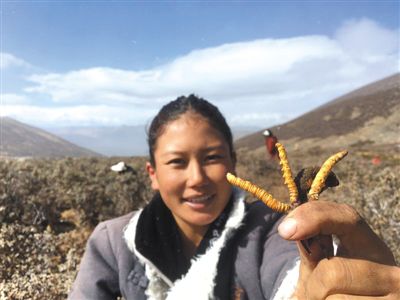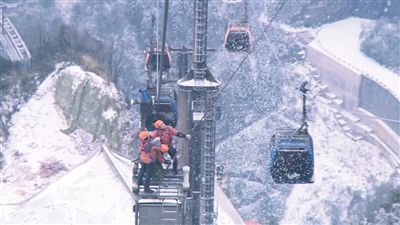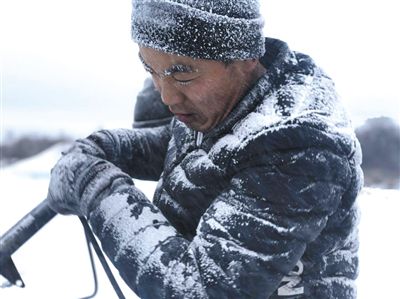On the occasion of the May 4th Youth Day, the Beijing News, together with Tencent News and Aauto Quicker, launched a planning report "Picture Book of Four Seasons of Hundred Workers" to show the elegance of young craftsmen. The report shows the most unique and wonderful careers. Shooting aurora in the Arctic at-30℃, searching for Cordyceps on the snowy mountain at an altitude of 4,700 meters, and deicing the cableway at an altitude of 1,000 meters & HELIP; … We recorded the most amazing moments and touching stories of these workers with words and videos, including careers you have never heard of, wonders you have never seen, and life styles you have never tasted.
"finless porpoise bodyguard":
Father let me see the finless porpoise, and I will let the children see it.
He Dongshun, patrol officer of China Green Hair Club East Dongting Lake finless porpoise reserve.

He Dongshun (first from the right) and his colleagues are monitoring ship pollution in the waters of Dongting Bridge.
He Dong grew up next to Dongting Lake. After graduating from college, he chose to go back to his hometown and became a patrolman in the East Dongting Lake finless porpoise reserve of China Green Hair Association. "It may be influenced by my father, who protects the finless porpoise." Three generations of He Dongshun’s family used to make a living by fishing, until his father’s generation, because an encounter had an indissoluble bond with the finless porpoise, which changed the later life track.
"One day he went fishing and found that the net was entangled in a small finless porpoise. The female finless porpoise has been arching under the back of the small finless porpoise and arching it to the water, because the finless porpoise is a mammal and needs to surface to breathe. At that time, my father felt that maternal love was very great. " That is, from that moment on, He Dongshun’s father and finless porpoise had some inseparable connection. Since then, he began to protect the finless porpoise, and gradually gathered the fishermen around him to protect it. These fish hunters have since become guardians.
"finless porpoise bodyguards" have to work on water for 360 days a year, and spring and winter are their busiest seasons. March-May in spring is the season for finless porpoises to breed and migrate, and October to January of the following year is the season for Dongting Lake to retreat. During this period, finless porpoises need to be protected most, and "bodyguards" should be on duty in Dongting Lake 24 hours a day. They are sunburned when they patrol the lake in summer, and the cold wind in winter seems to be carved into the bones, "but there is no way out."
The saddest thing for me is to see the finless porpoise still smiling when he died. If we young people don’t protect the finless porpoise, no one will protect it anymore. My meaning is not to let the finless porpoise go extinct. My father let me see the finless porpoise, and I will let my children see it.
"Chinese caterpillar fungus is beauty":
Set up a cooperative to help local sell Cordyceps matsutake.
Gerongzhuomu Villagers in Gongsha Village, Daocheng County, Ganzi Prefecture, Sichuan Province

It is not easy to find Cordyceps sinensis. Every time I find a Cordyceps sinensis, Zhuomu is extremely excited.
Gerong Zhuomu, a Tibetan girl born in 1997, is already the mother of two children. Every May, she and her family bring livestock and enough dry food to live in a small house on Cordyceps Mountain, which can save three hours on the road every day. Cordyceps can only be picked for more than one month each year, which is an important source of income for them.
Only the highest mountain will grow Cordyceps, and the place where Gerongzhuomu collects Cordyceps is about 4700 meters above sea level. Cordyceps grows invisibly and needs rich experience and some luck to find it. Zhuomu said with a smile that since she got married for four years, her husband from Yunnan has been going up the mountain together every year, and so far no cordyceps has been found. Even Zhuomu himself can only find five or six at most a day. So every time I find a Cordyceps, Zhuomu is extremely excited.
After the Cordyceps season, it is followed by the Tricholoma matsutake season, and Zhuomu will go to the Tricholoma matsutake mountain to look for Tricholoma matsutake in the forest. In Zhuomu’s hometown, many old Tibetans don’t know Chinese, so they can’t go out to work. They can only make a living by digging Cordyceps and Tricholoma matsutake.
In 2017, Zhuomu asked her father to shoot a video of picking Cordyceps for her and send it online. Zhuomu became popular and became a "beauty of Cordyceps" with millions of fans. She set up a cooperative in her hometown to help local residents sell Cordyceps matsutake. This girl with only primary school culture said that she hopes to promote her beautiful hometown through her own efforts and let her folks live a better life.
Picking cordyceps sinensis is the best thing for me. I have also gone out to work, and life outside is very stressful. I am the happiest in my hometown, and I can’t compare with it anywhere. Now this is the life I want, and I think this life is called living.
Coral growers:
Coral stump is planted back on the reef, and we need to make a sound for coral.
Xia Jiaxiang, Secretary General of Shenzhen Coral Conservation Organization "Hidden Love"

Divers pick up and plant corals at the bottom of the sea.
Coral is becoming less and less due to trawling and garbage coverage. There is such a group of people who silently guard and rescue corals. Xia Jiaxiang, secretary general of Shenzhen Coral Conservation Organization "Hidden Love", said that corals grow fastest in summer. They dive into the bottom of the sea, pick up the coral residues broken by anchors, fishing nets and fishermen with fishing guns, fix them on a suspended net, isolate them from the sediment, observe them for six months to a year or so, and choose the coral residues that have recovered well to return to the reef.
Xia Jiaxiang began to participate in the volunteer activities of "Hidden Love" in 2012. According to its introduction, submarine operations are sometimes dangerous, but they all think it is worthwhile. When working underwater, ships are flying over their heads, and abandoned fishing nets are floating. Once people are trapped by fishing nets and the oxygen in the gas cylinders is just not enough, it will directly threaten their lives. Xia Jiaxiang said that sometimes the temperature is very low, and it will be shivering underwater, so you have to endure to get things done, "because someone has to do things."
"Divers are born with a feeling for corals that others can’t understand. You will think it is worthwhile to do this." Xia Jiaxiang expressed the hope that the whole society will realize the importance of coral to the whole ecology and the urgency of protecting coral, and that more people can participate.
Coral is a poor creature, which has been silently bearing the survival pressure brought by human beings at the bottom of the sea. Coral can’t make a sound, so we have to make a sound for it. The love for coral is born to divers, and every coral stump saved is their child.
Deicer:
De-icing of a 1,000-meter cableway meets strong wind in treading on thin ice.
Zhang Changheng Repairman of Tianmenshan Cableway in Zhangjiajie

Cableway repairmen deice ropeways at an altitude of 1,000 meters.
Every December, the steel wire cable and communication cable of Tianmenshan cableway in Zhangjiajie will be covered with snow and frozen, and the cableway repairman Zhang Changheng needs to deice the cableway at an altitude of 1,000 meters. If the ice on the wire rope is too heavy, it will break the communication cable, which will affect the communication between the upper and lower stations, and the safety line of the ropeway support will not be guaranteed.
Cableway repairmen carry out deicing operations in groups of three, with the temperature of MINUS ten degrees in the sky, and the strong wind blows on the face like a knife. Zhang Changheng said that the pole for deicing is about six meters long and weighs 256 pounds. Every time one person holds the bottom of the pole as a fulcrum, and the other person throws the pole directly on it and slams it back and forth. "It’s hard when you smash it. On such a cold day, you will basically sweat after smashing the ice."
From time to time, the de-icing operation will encounter strong winds, and the swing range of the cable car will increase. If it shakes too much, the cable car bracket will be damaged. They sway from side to side with the cable car in the air, and all actions should be careful, which can be described as treading on thin ice.
Tianmenshan cableway has 57 supports. When deicing, the repairman should pay attention to the operation of each bracket, "look at whether the rim is broken or worn, and whether the wire rope is running off." A deicing operation takes about one and a half hours, at least four times a day. Zhang Changheng said: "Everything is to ensure the normal operation of the ropeway. It is very fulfilling for tourists to sit on the safe ropeway and enjoy the snow scene."
Although deicing at high altitude is cold, tiring and dangerous, I feel very satisfied to see tourists safely sitting on the ropeway. It is worthwhile to ensure the normal operation of the ropeway.
"Forest Guard":
Lighting fires in summer to protect forests and collecting ice in winter to help tourism.
Deputy Chief of the Forest Fire Brigade directly under the Fire Prevention Office of Mohe City, Heilongjiang Province, Bo Han

In winter, forest firefighters will be ice pickers for about 20 days.
There is a forest fire brigade of about 300 people in Mohe, Heilongjiang. They usually have to ensure the fire safety of Daxinganling forest. By the end of November every year, after the forest is covered with snow, they will be ice pickers for about 20 days. Bo Han, deputy battalion chief, said that they have lived a life of "two worlds of ice and fire" for more than ten years.
Shovel the snow on the river to expose the ice as bright as a mirror. If the ice quality is good, they will start to pick ice. They invented their own ice harvesting equipment, cut the whole piece of ice into ice cubes weighing about 200 Jin, fished it out of the river, frozen it for two hours to dry the water, and loaded it into a car to carry it away. Be very careful when picking ice. If you accidentally trample the ice, you will fall into the glacier. During the ice harvest season, they are busy from 7 am to sunset every day, and they can produce more than 2,000 pieces of ice a day. These ice cubes will be made into ice sculptures for local tourism.
When the first thunder sounded in June, they were always nervous about the safety of the forest. The climate here is dry, and if it doesn’t rain, lightning fire will easily appear in the forest. It is difficult to find the location of lightning and fire, and it is five or six kilometers as soon as you walk in. It is very difficult for them to walk in the lush forest with fire fighting equipment on their backs. Bo Han proudly said that although there are many mountain fires every year, there have been no casualties in their team in recent years. "We have to learn how to protect ourselves every year."
I have been engaged in this profession for more than 20 years. To be honest, this job is very bitter and tiring, but I feel very honored in my heart, because our team of 300 people has protected 770,000 hectares of green forests. After each fire is finished, I will feel gratified in retrospect.
"light hunter":
Shooting aurora at MINUS 30℃ wants to bring people a little light.
Anjiu astrophotographer

Aurora works shot by Anjiu.
Shooting aurora at the North Pole at MINUS 30℃, my limbs are freezing; Look at the roaring wild dog for a long time, thinking that you are going to face death; Driving in the dark and encountering a snowstorm, I lost my way … … These are the thrilling moments that an Jiu, an astronomical photographer, has encountered.
An Jiu, like a hunter, captured the fleeting sky and photographed countless amazing light and shadow. She used to be an ordinary employee of a consulting company, living a nine-to-five life every day. Three years ago, by chance, she took part in a friend’s starry photography activity. "The first time I saw the Milky Way with my own eyes, I was so shocked that I couldn’t breathe." Since then, whenever she has time, she has followed the teachers in the circle to study and shoot, chasing astronomical phenomena. As her works were gradually recognized, some magazine advertisements began to seek her cooperation. With these incomes, Anjiu began to concentrate on astrophotography.
Winter is the best season to shoot the aurora, and she often goes to Iceland and other places to chase the splendid aurora wonders. She said that the most impressive thing was that I met a roaring wild dog while shooting at the Arctic at MINUS 30℃ and looked at her for a long time. "At that time, I felt that I was dying, but I still kept my camera. That is, from that moment on, I am sure that this is what I love and am willing to pay for. "
When I shared my works online, more and more people sent me messages, some of them were cured by the starry sky like me, some of them went through the confusion period, and some of them regained their astronomical dreams. I think this is life affecting life. I want to convey some humanistic warmth through my works, which can bring even a little light to people.
Written by/Beijing News reporter Tian Yuwen Li Shuyi Zhang Shuangying Cao Yuru Li Huishi Wang Xingtong Zhang Wei Intern Qian Jiaxin Photo/Respondent Photo courtesy
Editor in Charge: Ji Xiang
关于作者